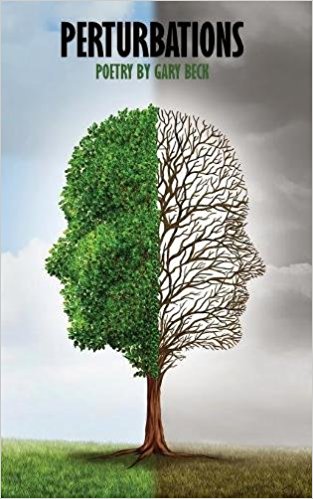Gary Beck, Perturbations
reviewed by Alison McBain

Perturbations Publisher: Winter Goose Publishing Date: October 20, 2017 Length: 128 pages ISBN: 1941058701; 9781941058701 |
I’m always excited to pick up a new collection of poetry by Gary Beck, because his work challenges the status quo and our preconceptions, examining issues both universal and personal. His new work, Perturbations, is no exception.
Sometimes morose, sometimes with brief glimmerings of hope, it explores a variety of themes, some new to Mr. Beck’s repertoire and some revisted.
Some of the themes include: questioning the structure of society, culture and life; sexuality versus love; man’s interaction with the natural world; war and its aftermath; the past and its connection to the present; death and the afterlife; dreams versus reality; music and emotions; God and religion; carnality versus love; and missed connections with strangers and moments of time.
Mr. Beck has a skill in laying out in stark detail the interior thoughts of moments that are lost beneath the shuffle of the everyday, such as the ending of a relationship, a moment shared with a stranger, and the beauty/danger inherent in a subway ride.
This collection is about how things are connected, including the paradoxical subject of endings and their link to new beginnings. The past connected to the present, war connected to culture, sexuality and nature, and man’s interaction with the natural world. It is full of questions, both overt and implied. How dreams can either clash with survival or complement it; how desires can be destructive or motivating, even if thwarted; how people are people, living side by side as neighbors, no matter where or how their lives began.
There are also touches of comedy, such as the Onionesque poem “What I Would Like to Find One Day When Opening a Wall Street Journal” that has sharks coming ashore to live with people and cats plotting to take over. Or “Doggie Days,” which talks about how puppies have it easy, but there are many burdens they will have to shoulder when they become adult dogs. Or “Precious Poets,” poking fun at poetry and its detractors.
Sometimes, Mr. Beck plays with form, such as in “Questions of Youth,” which is phrased almost exclusively in questions, leading the reader to a specific, implied answer. Most times, the poems explore the nebulous future of an older generation faced with mortality, changing values, and environmental and political concerns that might outlast them.
Most of the poems are about one page, with a few longer poems providing variety. They are often free verse, some written in a sparse or conversational style, some with heavily descriptive phrases. There are a few exceptions to the rule, including rhymed verse such as “Future Hopes” and “Redemption: In Memory of William Blake.”
History and historic literature also plays a big part in the themes of this collection. Wars that are mentioned stretch as far back as the destruction of Troy, in addition to looking at more recent wars up to WWII.
Other, more recent political events are often hinted at rather than examined overtly. The ancient gods, classical mythology and notable poets are referenced and celebrated. The ideas focus on history and man’s progression from the distant past through today. One such example is “Shattered”:
The goat god plays his mocking pipes,
my feet move in the ancient dance,
but my heart is as stone as statue.
This beautiful phrasing of the last line reverses the reader’s expectations and recalls a connection to the myth of Medusa, wherein one glance at her face turns the viewer to stone. In this way, the narrator is alive and present, but his heart has become stone with one glance, albeit only in his memory, at his lost beloved.
Loss is a recurrent theme. Loss of life, loss of love, loss of hope. But there can also be beauty found in loss, a profound and poignant memory that inspires as much as it devours. Each stark image of loss paints a profound picture, such as the poem “River’s Edge”:
My love is a strand of hair
gleaming on my sweater.
Nothing else remains.
She left me for another.
I sit alone by the East River
and far away,
fading into darkness,
a distant light of a ship flickers,
its foghorn breaks the silence
with a piercing wail
that is my song,
merges swiftly with city clamor,
quickly disappears,
lost in midnight current.
The clarity of the vision is absolute and beautiful... and heartbreaking.
I wish I had room to quote all the poems that resonated with me as a reader. Many were emotional reflections about love and loss, beauty found and gone, and speculations about death and the afterlife. The poems often have a bittersweet tone, not solely mournful or desolate. There is love remembered and in the midst of loss, beauty to be found in the everyday.
While I would definitely not call the overall tone of the collection uplifting, there are places of hope in the midst of bereavement, and the strength of memory to carry the reader/narrator through the currents of loneliness.
At heart, these connections between disparate elements and themes can best be summed up in the words of Mr. Beck, himself, in “Paradox”:
Blueberries and rape,
hummingbirds and persecution,
Pi and chaos,
contradictions seem to be
the very core of mystery,
for within them is contained
the good and evil in mankind.
Every time I read Mr. Beck, I find something new to enjoy in his work. I really enjoyed Perturbations, and I hope you will, too.
Copyright © 2017 by Alison McBain

